Project Management Methodologies Analysis Report - BSOM071
VerifiedAdded on 2022/08/14
|10
|2025
|14
Report
AI Summary
This report provides a comprehensive overview of various project management methodologies, including Waterfall, Agile, Rapid Application Development, and Adaptive project management approaches. It begins by defining project management and its importance in ensuring projects are delivered on time and within budget. The report then delves into a comparative analysis of different methodologies, highlighting their key features, advantages, and disadvantages. Furthermore, it emphasizes the critical role of the project team, outlining the responsibilities of each member, such as project managers, team members, sponsors, and business analysts. The report also includes a reflection on team improvements, emphasizing the need for effective communication, team member engagement, and self-assessment to enhance project outcomes. The conclusion reiterates the significance of project management knowledge in successfully executing projects, making it a valuable resource for students and professionals alike.
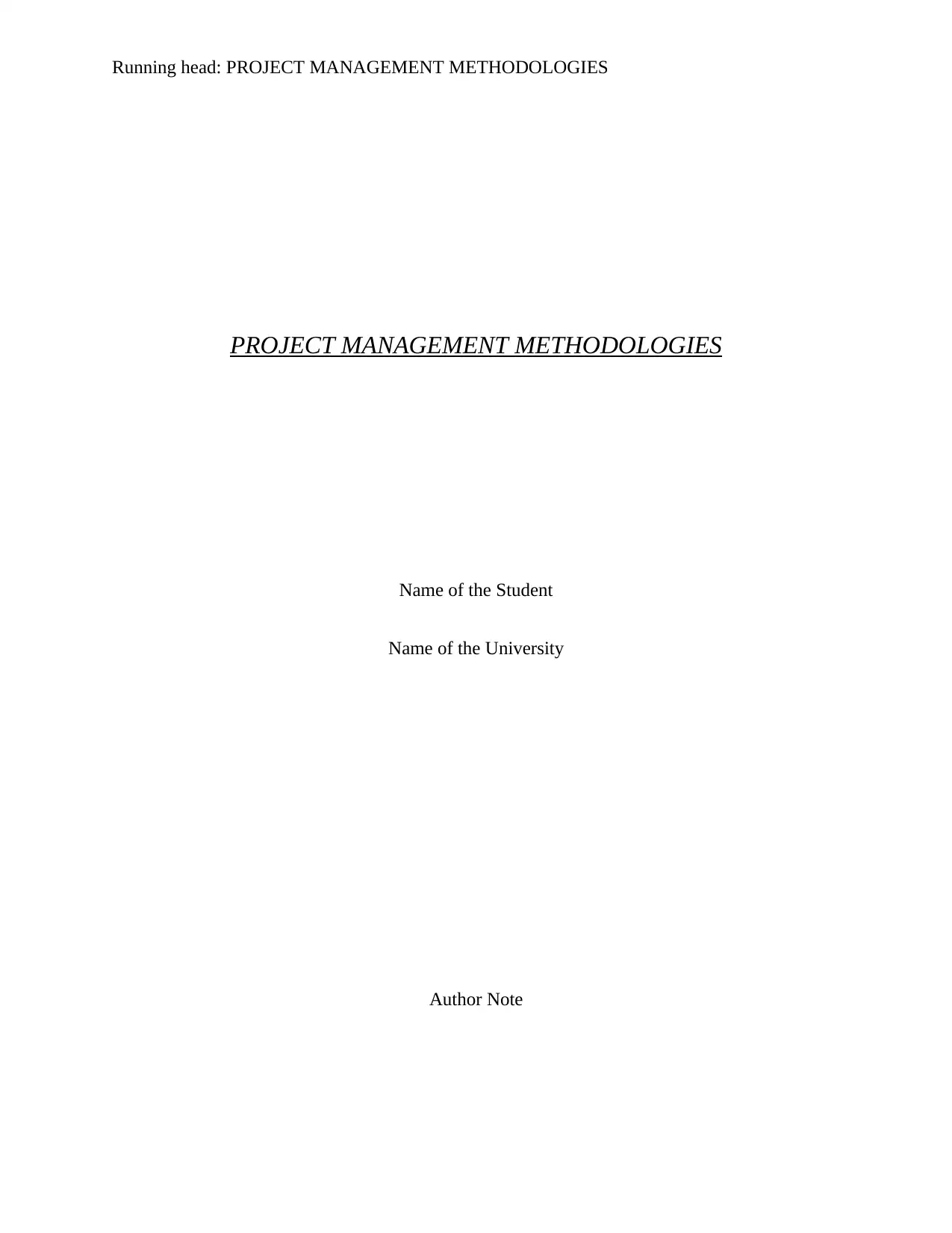
Running head: PROJECT MANAGEMENT METHODOLOGIES
PROJECT MANAGEMENT METHODOLOGIES
Name of the Student
Name of the University
Author Note
PROJECT MANAGEMENT METHODOLOGIES
Name of the Student
Name of the University
Author Note
Paraphrase This Document
Need a fresh take? Get an instant paraphrase of this document with our AI Paraphraser
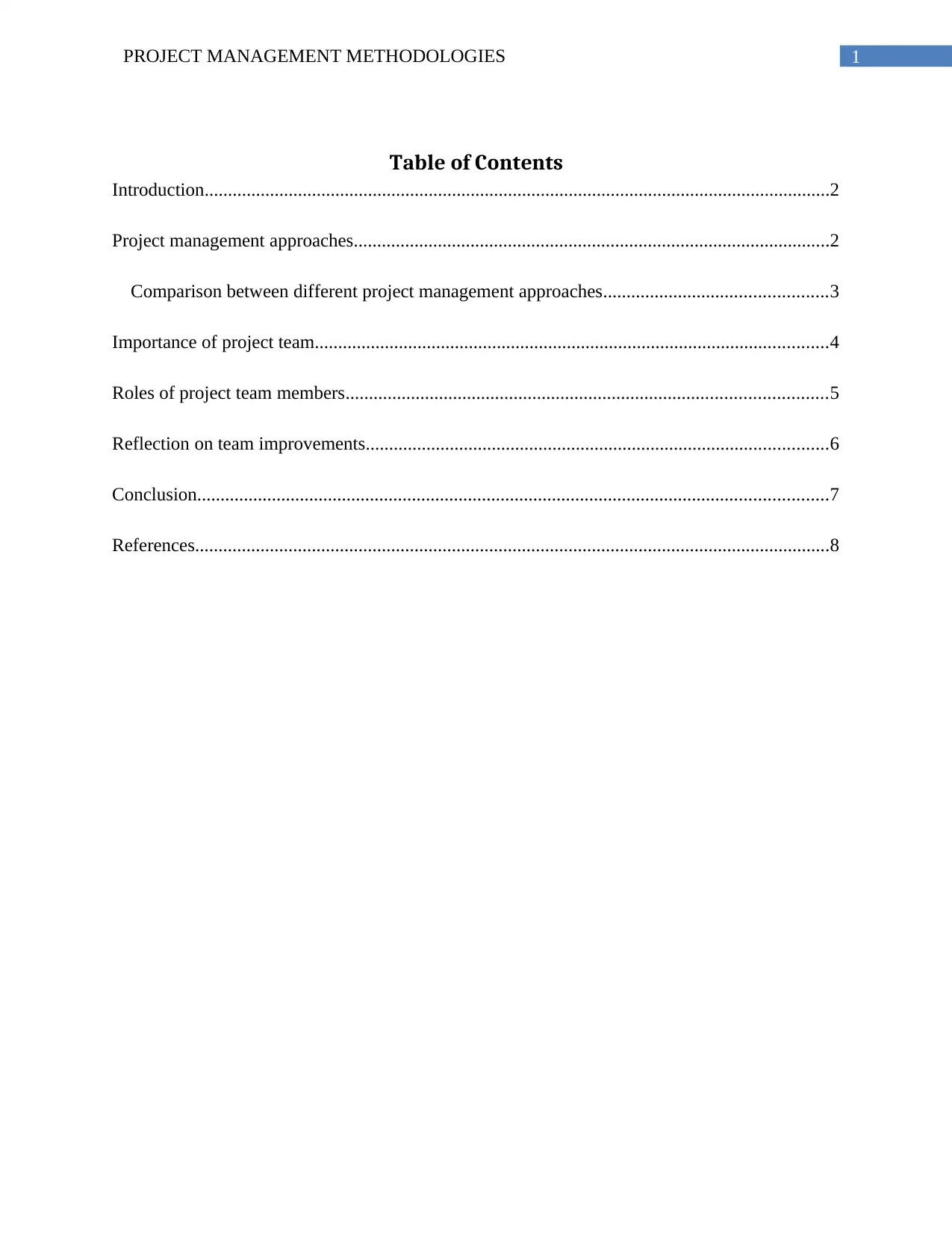
1PROJECT MANAGEMENT METHODOLOGIES
Table of Contents
Introduction......................................................................................................................................2
Project management approaches......................................................................................................2
Comparison between different project management approaches................................................3
Importance of project team..............................................................................................................4
Roles of project team members.......................................................................................................5
Reflection on team improvements...................................................................................................6
Conclusion.......................................................................................................................................7
References........................................................................................................................................8
Table of Contents
Introduction......................................................................................................................................2
Project management approaches......................................................................................................2
Comparison between different project management approaches................................................3
Importance of project team..............................................................................................................4
Roles of project team members.......................................................................................................5
Reflection on team improvements...................................................................................................6
Conclusion.......................................................................................................................................7
References........................................................................................................................................8
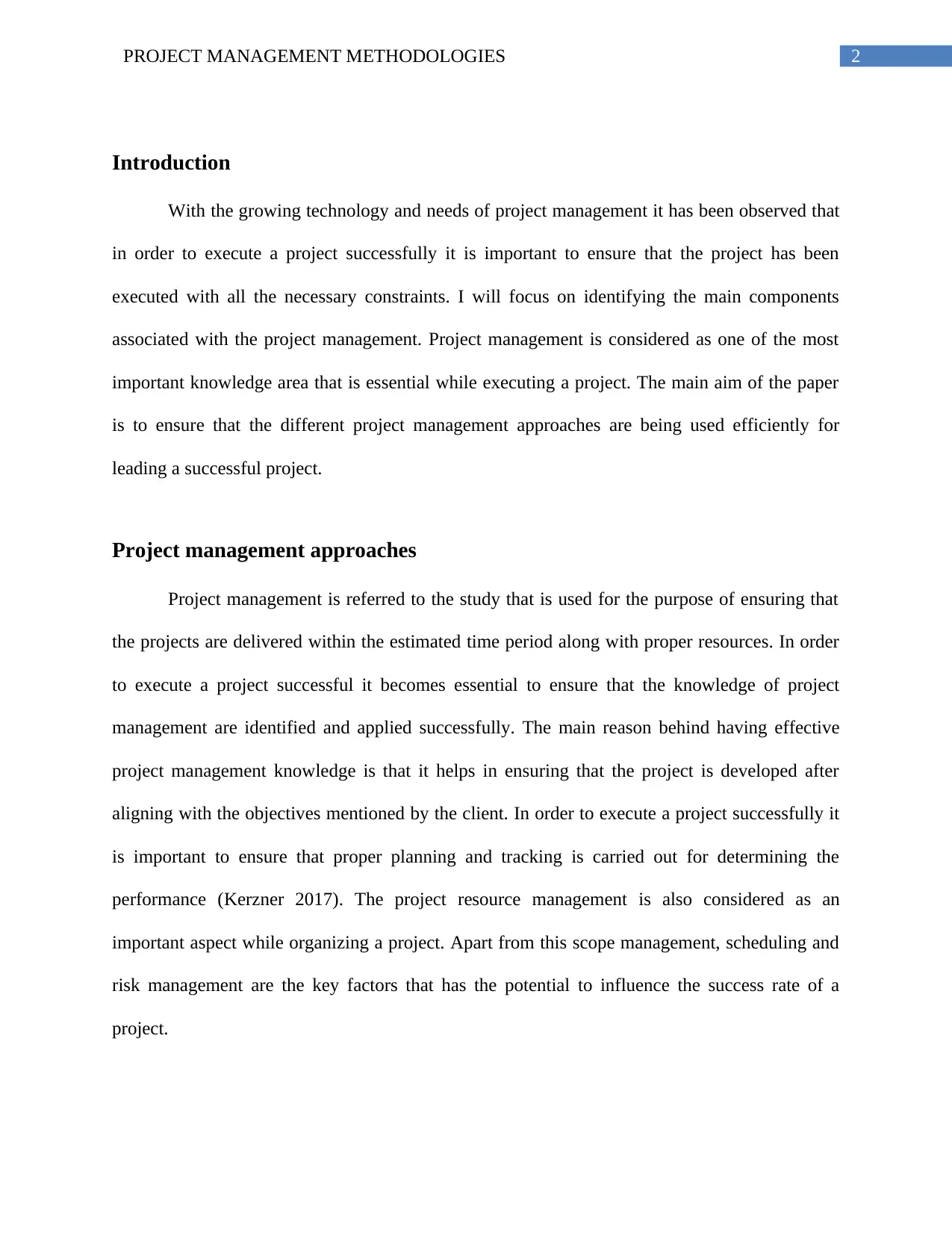
2PROJECT MANAGEMENT METHODOLOGIES
Introduction
With the growing technology and needs of project management it has been observed that
in order to execute a project successfully it is important to ensure that the project has been
executed with all the necessary constraints. I will focus on identifying the main components
associated with the project management. Project management is considered as one of the most
important knowledge area that is essential while executing a project. The main aim of the paper
is to ensure that the different project management approaches are being used efficiently for
leading a successful project.
Project management approaches
Project management is referred to the study that is used for the purpose of ensuring that
the projects are delivered within the estimated time period along with proper resources. In order
to execute a project successful it becomes essential to ensure that the knowledge of project
management are identified and applied successfully. The main reason behind having effective
project management knowledge is that it helps in ensuring that the project is developed after
aligning with the objectives mentioned by the client. In order to execute a project successfully it
is important to ensure that proper planning and tracking is carried out for determining the
performance (Kerzner 2017). The project resource management is also considered as an
important aspect while organizing a project. Apart from this scope management, scheduling and
risk management are the key factors that has the potential to influence the success rate of a
project.
Introduction
With the growing technology and needs of project management it has been observed that
in order to execute a project successfully it is important to ensure that the project has been
executed with all the necessary constraints. I will focus on identifying the main components
associated with the project management. Project management is considered as one of the most
important knowledge area that is essential while executing a project. The main aim of the paper
is to ensure that the different project management approaches are being used efficiently for
leading a successful project.
Project management approaches
Project management is referred to the study that is used for the purpose of ensuring that
the projects are delivered within the estimated time period along with proper resources. In order
to execute a project successful it becomes essential to ensure that the knowledge of project
management are identified and applied successfully. The main reason behind having effective
project management knowledge is that it helps in ensuring that the project is developed after
aligning with the objectives mentioned by the client. In order to execute a project successfully it
is important to ensure that proper planning and tracking is carried out for determining the
performance (Kerzner 2017). The project resource management is also considered as an
important aspect while organizing a project. Apart from this scope management, scheduling and
risk management are the key factors that has the potential to influence the success rate of a
project.
⊘ This is a preview!⊘
Do you want full access?
Subscribe today to unlock all pages.

Trusted by 1+ million students worldwide
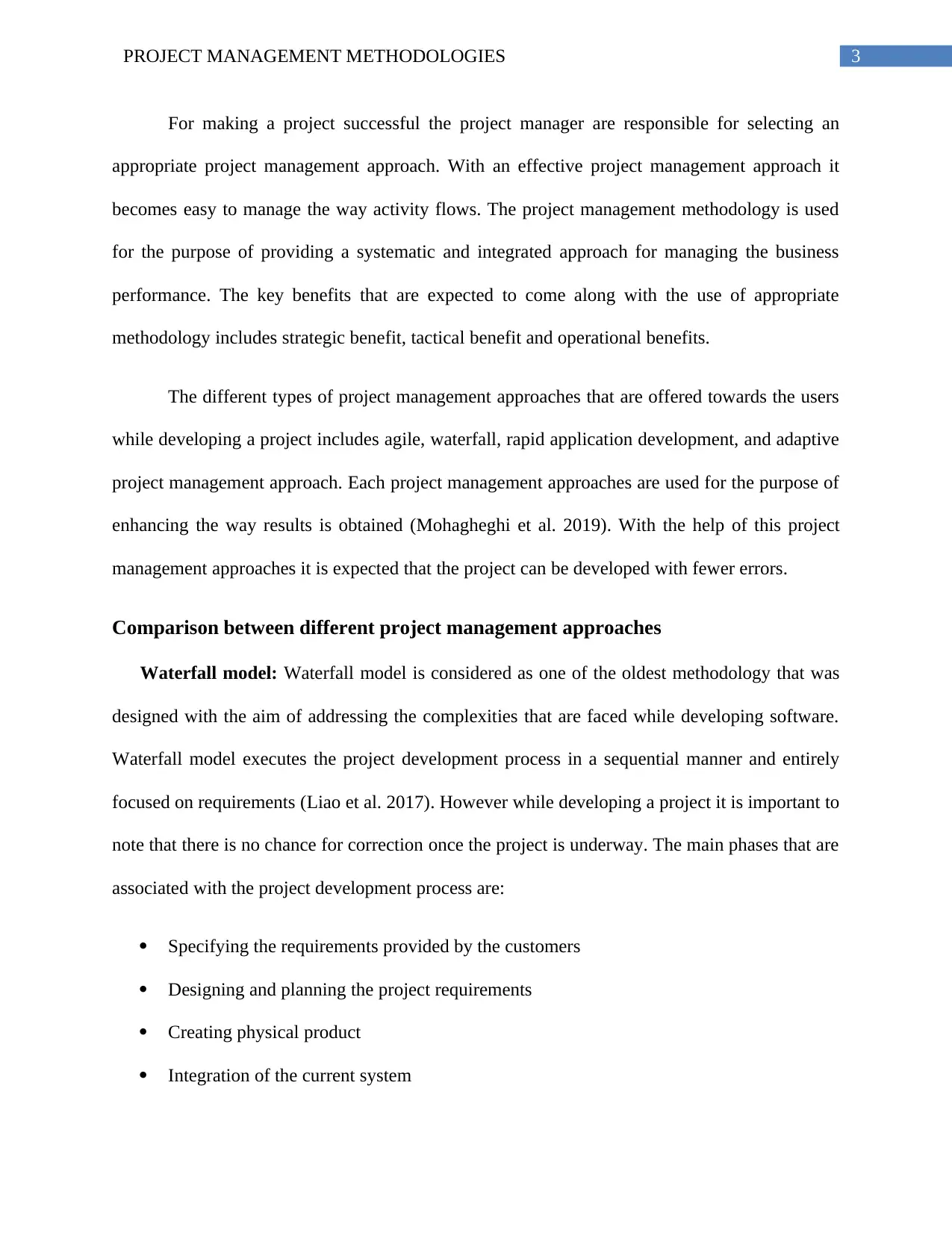
3PROJECT MANAGEMENT METHODOLOGIES
For making a project successful the project manager are responsible for selecting an
appropriate project management approach. With an effective project management approach it
becomes easy to manage the way activity flows. The project management methodology is used
for the purpose of providing a systematic and integrated approach for managing the business
performance. The key benefits that are expected to come along with the use of appropriate
methodology includes strategic benefit, tactical benefit and operational benefits.
The different types of project management approaches that are offered towards the users
while developing a project includes agile, waterfall, rapid application development, and adaptive
project management approach. Each project management approaches are used for the purpose of
enhancing the way results is obtained (Mohagheghi et al. 2019). With the help of this project
management approaches it is expected that the project can be developed with fewer errors.
Comparison between different project management approaches
Waterfall model: Waterfall model is considered as one of the oldest methodology that was
designed with the aim of addressing the complexities that are faced while developing software.
Waterfall model executes the project development process in a sequential manner and entirely
focused on requirements (Liao et al. 2017). However while developing a project it is important to
note that there is no chance for correction once the project is underway. The main phases that are
associated with the project development process are:
Specifying the requirements provided by the customers
Designing and planning the project requirements
Creating physical product
Integration of the current system
For making a project successful the project manager are responsible for selecting an
appropriate project management approach. With an effective project management approach it
becomes easy to manage the way activity flows. The project management methodology is used
for the purpose of providing a systematic and integrated approach for managing the business
performance. The key benefits that are expected to come along with the use of appropriate
methodology includes strategic benefit, tactical benefit and operational benefits.
The different types of project management approaches that are offered towards the users
while developing a project includes agile, waterfall, rapid application development, and adaptive
project management approach. Each project management approaches are used for the purpose of
enhancing the way results is obtained (Mohagheghi et al. 2019). With the help of this project
management approaches it is expected that the project can be developed with fewer errors.
Comparison between different project management approaches
Waterfall model: Waterfall model is considered as one of the oldest methodology that was
designed with the aim of addressing the complexities that are faced while developing software.
Waterfall model executes the project development process in a sequential manner and entirely
focused on requirements (Liao et al. 2017). However while developing a project it is important to
note that there is no chance for correction once the project is underway. The main phases that are
associated with the project development process are:
Specifying the requirements provided by the customers
Designing and planning the project requirements
Creating physical product
Integration of the current system
Paraphrase This Document
Need a fresh take? Get an instant paraphrase of this document with our AI Paraphraser
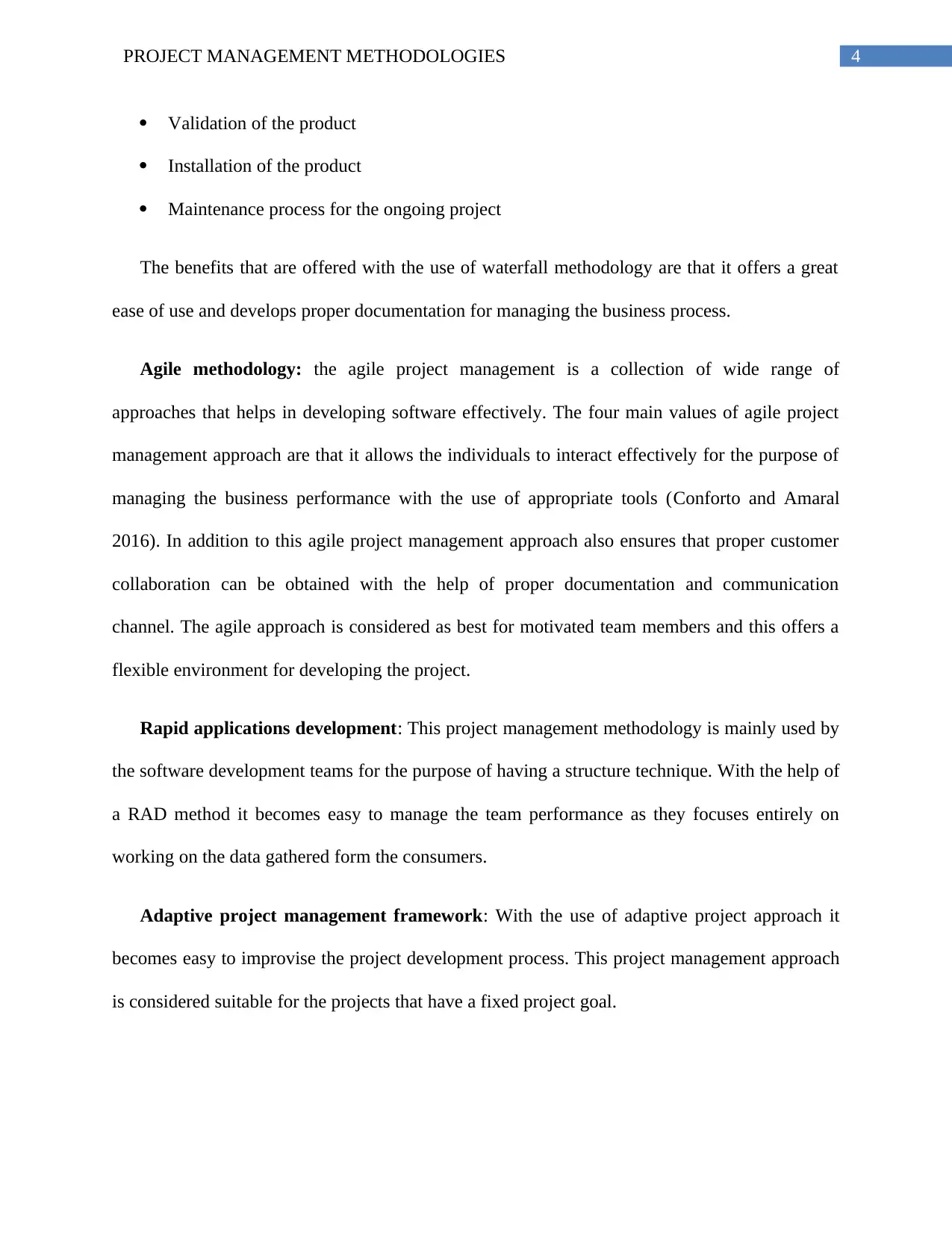
4PROJECT MANAGEMENT METHODOLOGIES
Validation of the product
Installation of the product
Maintenance process for the ongoing project
The benefits that are offered with the use of waterfall methodology are that it offers a great
ease of use and develops proper documentation for managing the business process.
Agile methodology: the agile project management is a collection of wide range of
approaches that helps in developing software effectively. The four main values of agile project
management approach are that it allows the individuals to interact effectively for the purpose of
managing the business performance with the use of appropriate tools (Conforto and Amaral
2016). In addition to this agile project management approach also ensures that proper customer
collaboration can be obtained with the help of proper documentation and communication
channel. The agile approach is considered as best for motivated team members and this offers a
flexible environment for developing the project.
Rapid applications development: This project management methodology is mainly used by
the software development teams for the purpose of having a structure technique. With the help of
a RAD method it becomes easy to manage the team performance as they focuses entirely on
working on the data gathered form the consumers.
Adaptive project management framework: With the use of adaptive project approach it
becomes easy to improvise the project development process. This project management approach
is considered suitable for the projects that have a fixed project goal.
Validation of the product
Installation of the product
Maintenance process for the ongoing project
The benefits that are offered with the use of waterfall methodology are that it offers a great
ease of use and develops proper documentation for managing the business process.
Agile methodology: the agile project management is a collection of wide range of
approaches that helps in developing software effectively. The four main values of agile project
management approach are that it allows the individuals to interact effectively for the purpose of
managing the business performance with the use of appropriate tools (Conforto and Amaral
2016). In addition to this agile project management approach also ensures that proper customer
collaboration can be obtained with the help of proper documentation and communication
channel. The agile approach is considered as best for motivated team members and this offers a
flexible environment for developing the project.
Rapid applications development: This project management methodology is mainly used by
the software development teams for the purpose of having a structure technique. With the help of
a RAD method it becomes easy to manage the team performance as they focuses entirely on
working on the data gathered form the consumers.
Adaptive project management framework: With the use of adaptive project approach it
becomes easy to improvise the project development process. This project management approach
is considered suitable for the projects that have a fixed project goal.
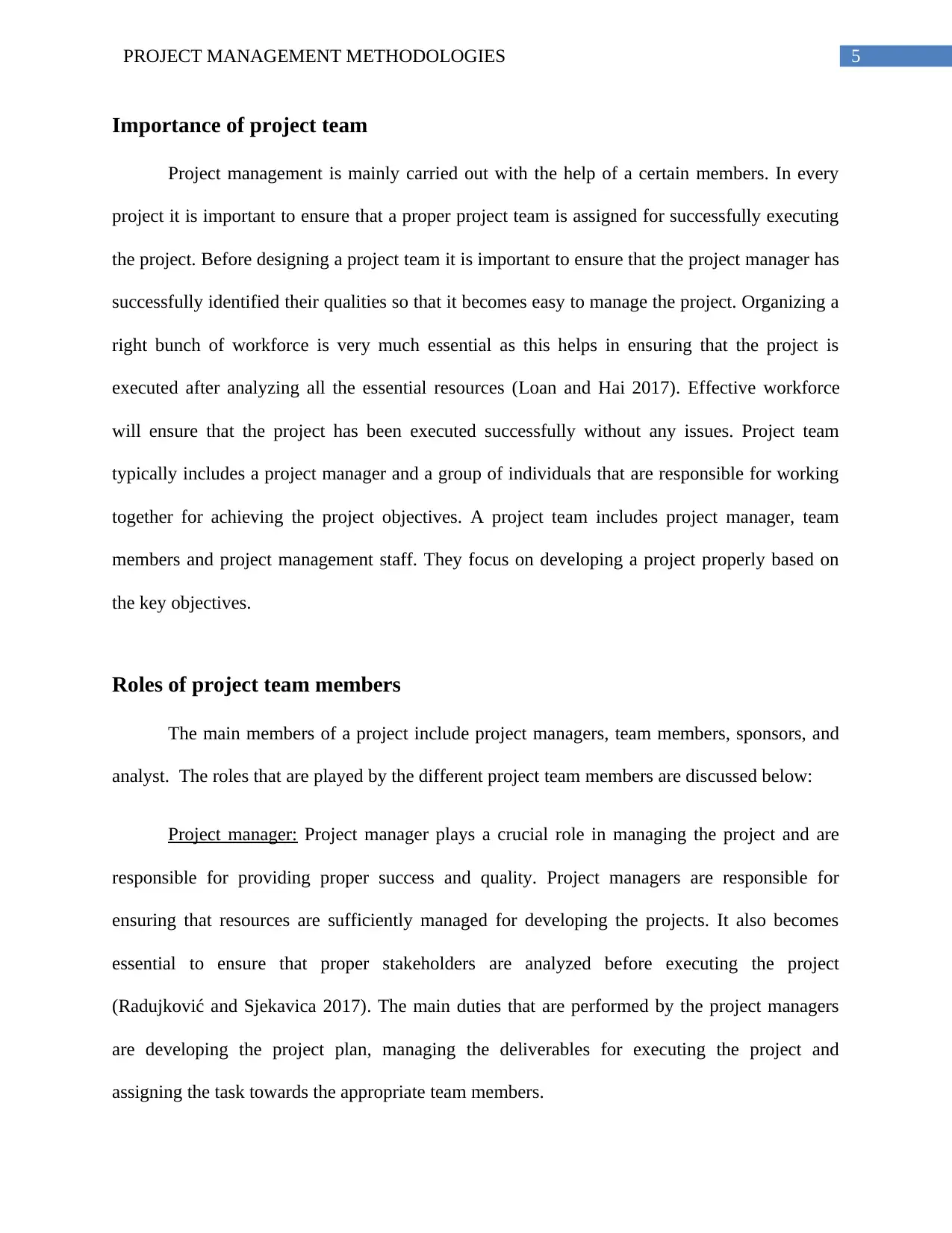
5PROJECT MANAGEMENT METHODOLOGIES
Importance of project team
Project management is mainly carried out with the help of a certain members. In every
project it is important to ensure that a proper project team is assigned for successfully executing
the project. Before designing a project team it is important to ensure that the project manager has
successfully identified their qualities so that it becomes easy to manage the project. Organizing a
right bunch of workforce is very much essential as this helps in ensuring that the project is
executed after analyzing all the essential resources (Loan and Hai 2017). Effective workforce
will ensure that the project has been executed successfully without any issues. Project team
typically includes a project manager and a group of individuals that are responsible for working
together for achieving the project objectives. A project team includes project manager, team
members and project management staff. They focus on developing a project properly based on
the key objectives.
Roles of project team members
The main members of a project include project managers, team members, sponsors, and
analyst. The roles that are played by the different project team members are discussed below:
Project manager: Project manager plays a crucial role in managing the project and are
responsible for providing proper success and quality. Project managers are responsible for
ensuring that resources are sufficiently managed for developing the projects. It also becomes
essential to ensure that proper stakeholders are analyzed before executing the project
(Radujković and Sjekavica 2017). The main duties that are performed by the project managers
are developing the project plan, managing the deliverables for executing the project and
assigning the task towards the appropriate team members.
Importance of project team
Project management is mainly carried out with the help of a certain members. In every
project it is important to ensure that a proper project team is assigned for successfully executing
the project. Before designing a project team it is important to ensure that the project manager has
successfully identified their qualities so that it becomes easy to manage the project. Organizing a
right bunch of workforce is very much essential as this helps in ensuring that the project is
executed after analyzing all the essential resources (Loan and Hai 2017). Effective workforce
will ensure that the project has been executed successfully without any issues. Project team
typically includes a project manager and a group of individuals that are responsible for working
together for achieving the project objectives. A project team includes project manager, team
members and project management staff. They focus on developing a project properly based on
the key objectives.
Roles of project team members
The main members of a project include project managers, team members, sponsors, and
analyst. The roles that are played by the different project team members are discussed below:
Project manager: Project manager plays a crucial role in managing the project and are
responsible for providing proper success and quality. Project managers are responsible for
ensuring that resources are sufficiently managed for developing the projects. It also becomes
essential to ensure that proper stakeholders are analyzed before executing the project
(Radujković and Sjekavica 2017). The main duties that are performed by the project managers
are developing the project plan, managing the deliverables for executing the project and
assigning the task towards the appropriate team members.
⊘ This is a preview!⊘
Do you want full access?
Subscribe today to unlock all pages.

Trusted by 1+ million students worldwide
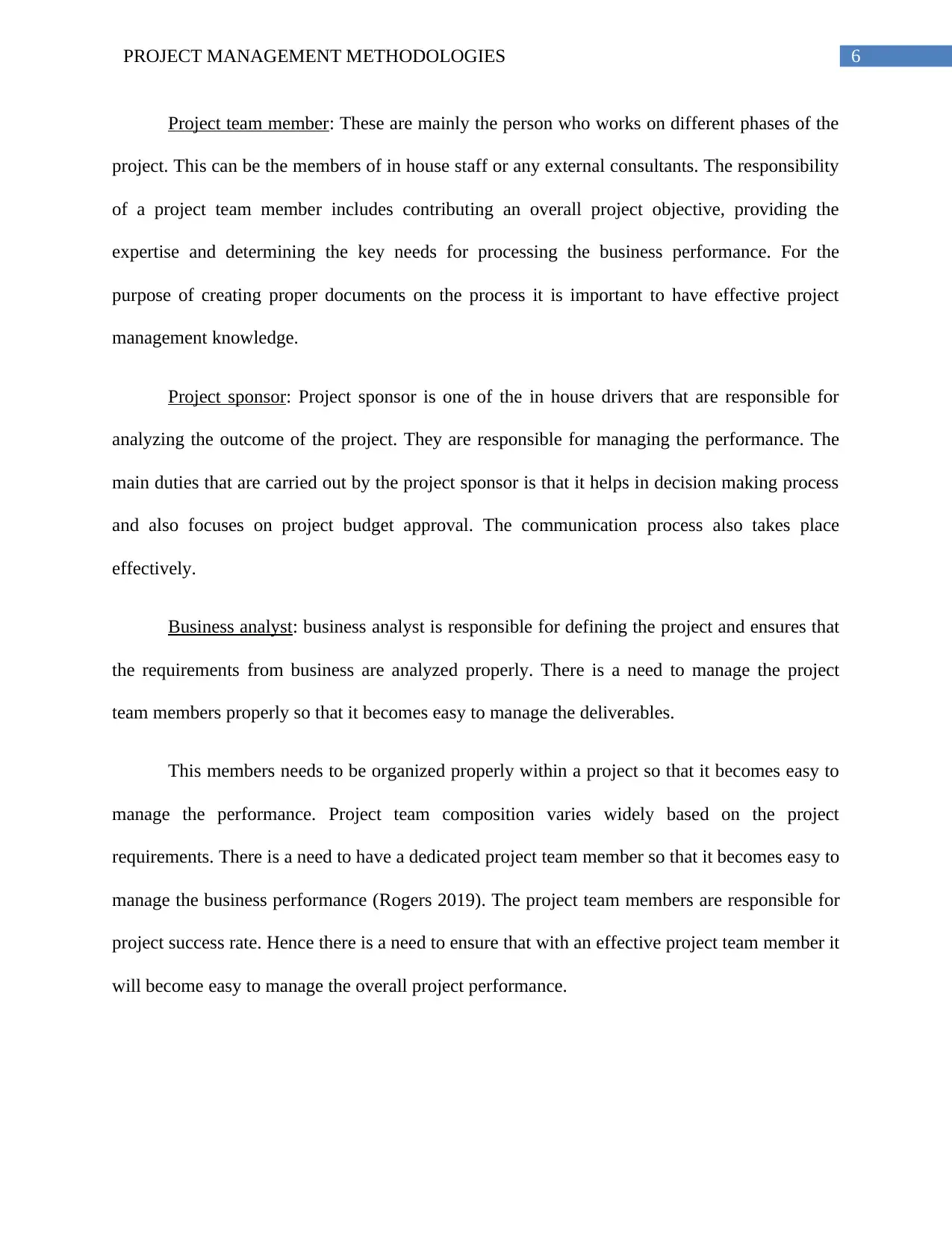
6PROJECT MANAGEMENT METHODOLOGIES
Project team member: These are mainly the person who works on different phases of the
project. This can be the members of in house staff or any external consultants. The responsibility
of a project team member includes contributing an overall project objective, providing the
expertise and determining the key needs for processing the business performance. For the
purpose of creating proper documents on the process it is important to have effective project
management knowledge.
Project sponsor: Project sponsor is one of the in house drivers that are responsible for
analyzing the outcome of the project. They are responsible for managing the performance. The
main duties that are carried out by the project sponsor is that it helps in decision making process
and also focuses on project budget approval. The communication process also takes place
effectively.
Business analyst: business analyst is responsible for defining the project and ensures that
the requirements from business are analyzed properly. There is a need to manage the project
team members properly so that it becomes easy to manage the deliverables.
This members needs to be organized properly within a project so that it becomes easy to
manage the performance. Project team composition varies widely based on the project
requirements. There is a need to have a dedicated project team member so that it becomes easy to
manage the business performance (Rogers 2019). The project team members are responsible for
project success rate. Hence there is a need to ensure that with an effective project team member it
will become easy to manage the overall project performance.
Project team member: These are mainly the person who works on different phases of the
project. This can be the members of in house staff or any external consultants. The responsibility
of a project team member includes contributing an overall project objective, providing the
expertise and determining the key needs for processing the business performance. For the
purpose of creating proper documents on the process it is important to have effective project
management knowledge.
Project sponsor: Project sponsor is one of the in house drivers that are responsible for
analyzing the outcome of the project. They are responsible for managing the performance. The
main duties that are carried out by the project sponsor is that it helps in decision making process
and also focuses on project budget approval. The communication process also takes place
effectively.
Business analyst: business analyst is responsible for defining the project and ensures that
the requirements from business are analyzed properly. There is a need to manage the project
team members properly so that it becomes easy to manage the deliverables.
This members needs to be organized properly within a project so that it becomes easy to
manage the performance. Project team composition varies widely based on the project
requirements. There is a need to have a dedicated project team member so that it becomes easy to
manage the business performance (Rogers 2019). The project team members are responsible for
project success rate. Hence there is a need to ensure that with an effective project team member it
will become easy to manage the overall project performance.
Paraphrase This Document
Need a fresh take? Get an instant paraphrase of this document with our AI Paraphraser
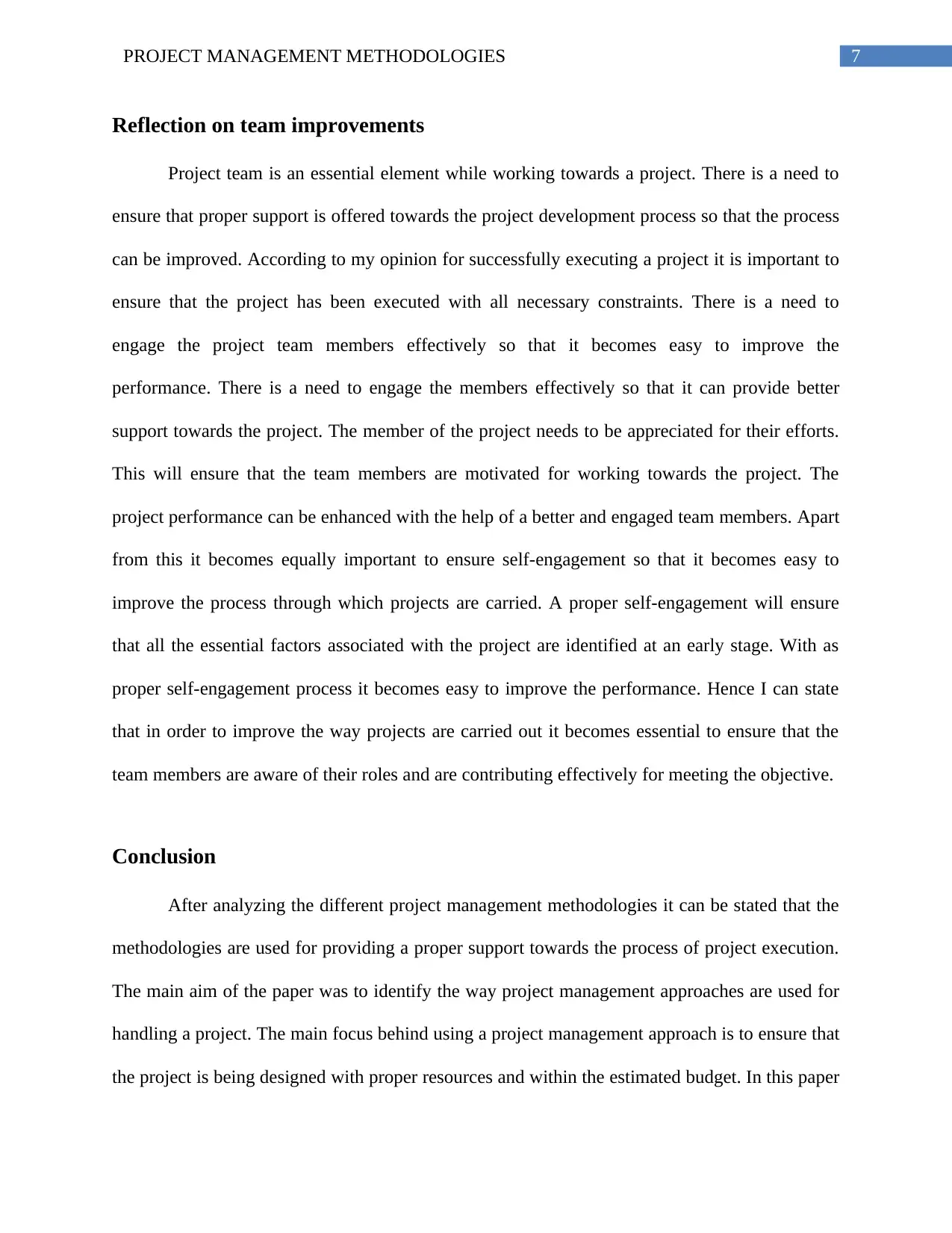
7PROJECT MANAGEMENT METHODOLOGIES
Reflection on team improvements
Project team is an essential element while working towards a project. There is a need to
ensure that proper support is offered towards the project development process so that the process
can be improved. According to my opinion for successfully executing a project it is important to
ensure that the project has been executed with all necessary constraints. There is a need to
engage the project team members effectively so that it becomes easy to improve the
performance. There is a need to engage the members effectively so that it can provide better
support towards the project. The member of the project needs to be appreciated for their efforts.
This will ensure that the team members are motivated for working towards the project. The
project performance can be enhanced with the help of a better and engaged team members. Apart
from this it becomes equally important to ensure self-engagement so that it becomes easy to
improve the process through which projects are carried. A proper self-engagement will ensure
that all the essential factors associated with the project are identified at an early stage. With as
proper self-engagement process it becomes easy to improve the performance. Hence I can state
that in order to improve the way projects are carried out it becomes essential to ensure that the
team members are aware of their roles and are contributing effectively for meeting the objective.
Conclusion
After analyzing the different project management methodologies it can be stated that the
methodologies are used for providing a proper support towards the process of project execution.
The main aim of the paper was to identify the way project management approaches are used for
handling a project. The main focus behind using a project management approach is to ensure that
the project is being designed with proper resources and within the estimated budget. In this paper
Reflection on team improvements
Project team is an essential element while working towards a project. There is a need to
ensure that proper support is offered towards the project development process so that the process
can be improved. According to my opinion for successfully executing a project it is important to
ensure that the project has been executed with all necessary constraints. There is a need to
engage the project team members effectively so that it becomes easy to improve the
performance. There is a need to engage the members effectively so that it can provide better
support towards the project. The member of the project needs to be appreciated for their efforts.
This will ensure that the team members are motivated for working towards the project. The
project performance can be enhanced with the help of a better and engaged team members. Apart
from this it becomes equally important to ensure self-engagement so that it becomes easy to
improve the process through which projects are carried. A proper self-engagement will ensure
that all the essential factors associated with the project are identified at an early stage. With as
proper self-engagement process it becomes easy to improve the performance. Hence I can state
that in order to improve the way projects are carried out it becomes essential to ensure that the
team members are aware of their roles and are contributing effectively for meeting the objective.
Conclusion
After analyzing the different project management methodologies it can be stated that the
methodologies are used for providing a proper support towards the process of project execution.
The main aim of the paper was to identify the way project management approaches are used for
handling a project. The main focus behind using a project management approach is to ensure that
the project is being designed with proper resources and within the estimated budget. In this paper

8PROJECT MANAGEMENT METHODOLOGIES
I have focused on comparing the different project management approaches and the way project
team members are responsible for successful execution of a project. Hence I can conclude that
proper project management knowledge helps in executing a project successfully.
I have focused on comparing the different project management approaches and the way project
team members are responsible for successful execution of a project. Hence I can conclude that
proper project management knowledge helps in executing a project successfully.
⊘ This is a preview!⊘
Do you want full access?
Subscribe today to unlock all pages.

Trusted by 1+ million students worldwide
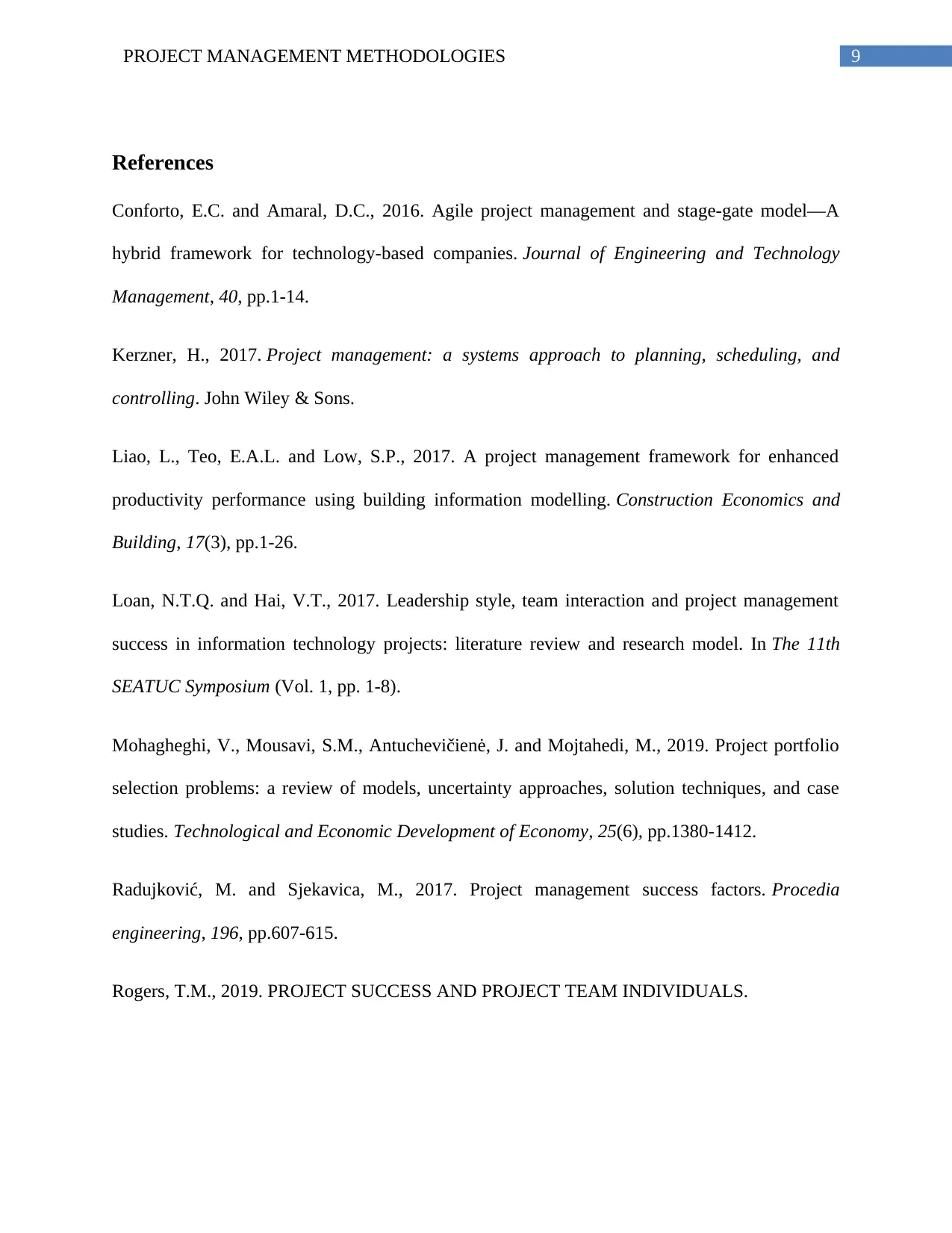
9PROJECT MANAGEMENT METHODOLOGIES
References
Conforto, E.C. and Amaral, D.C., 2016. Agile project management and stage-gate model—A
hybrid framework for technology-based companies. Journal of Engineering and Technology
Management, 40, pp.1-14.
Kerzner, H., 2017. Project management: a systems approach to planning, scheduling, and
controlling. John Wiley & Sons.
Liao, L., Teo, E.A.L. and Low, S.P., 2017. A project management framework for enhanced
productivity performance using building information modelling. Construction Economics and
Building, 17(3), pp.1-26.
Loan, N.T.Q. and Hai, V.T., 2017. Leadership style, team interaction and project management
success in information technology projects: literature review and research model. In The 11th
SEATUC Symposium (Vol. 1, pp. 1-8).
Mohagheghi, V., Mousavi, S.M., Antuchevičienė, J. and Mojtahedi, M., 2019. Project portfolio
selection problems: a review of models, uncertainty approaches, solution techniques, and case
studies. Technological and Economic Development of Economy, 25(6), pp.1380-1412.
Radujković, M. and Sjekavica, M., 2017. Project management success factors. Procedia
engineering, 196, pp.607-615.
Rogers, T.M., 2019. PROJECT SUCCESS AND PROJECT TEAM INDIVIDUALS.
References
Conforto, E.C. and Amaral, D.C., 2016. Agile project management and stage-gate model—A
hybrid framework for technology-based companies. Journal of Engineering and Technology
Management, 40, pp.1-14.
Kerzner, H., 2017. Project management: a systems approach to planning, scheduling, and
controlling. John Wiley & Sons.
Liao, L., Teo, E.A.L. and Low, S.P., 2017. A project management framework for enhanced
productivity performance using building information modelling. Construction Economics and
Building, 17(3), pp.1-26.
Loan, N.T.Q. and Hai, V.T., 2017. Leadership style, team interaction and project management
success in information technology projects: literature review and research model. In The 11th
SEATUC Symposium (Vol. 1, pp. 1-8).
Mohagheghi, V., Mousavi, S.M., Antuchevičienė, J. and Mojtahedi, M., 2019. Project portfolio
selection problems: a review of models, uncertainty approaches, solution techniques, and case
studies. Technological and Economic Development of Economy, 25(6), pp.1380-1412.
Radujković, M. and Sjekavica, M., 2017. Project management success factors. Procedia
engineering, 196, pp.607-615.
Rogers, T.M., 2019. PROJECT SUCCESS AND PROJECT TEAM INDIVIDUALS.
1 out of 10
Related Documents
Your All-in-One AI-Powered Toolkit for Academic Success.
+13062052269
info@desklib.com
Available 24*7 on WhatsApp / Email
![[object Object]](/_next/static/media/star-bottom.7253800d.svg)
Unlock your academic potential
Copyright © 2020–2026 A2Z Services. All Rights Reserved. Developed and managed by ZUCOL.





